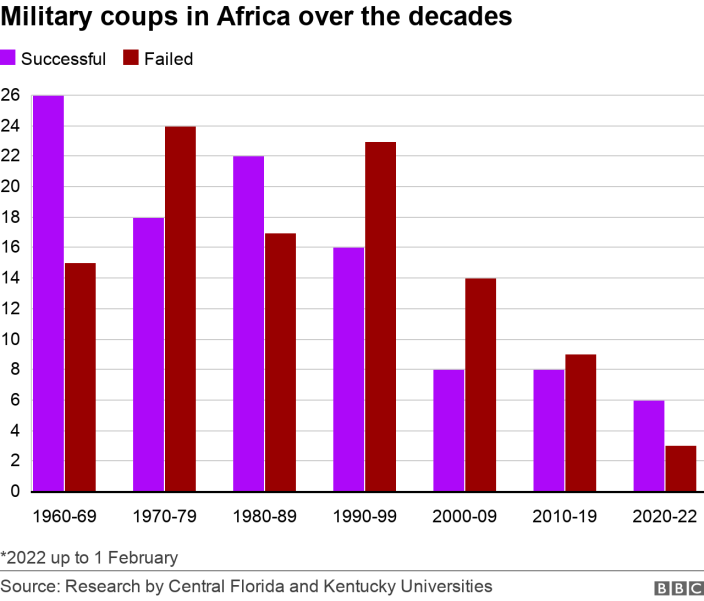
African leaders have complained about a “wave” of coups, after five military takeovers in the past year.
The number of coups in Africa had been falling, with the spread of elections and peaceful transfers of power.
Two of the countries where the army has seized power recently – Burkina Faso and Mali – have been struggling to contain Islamist insurgencies.
Last week, there was an attempted coup in Guinea-Bissau, which the president blamed on drug-trafficking gangs.
The country lies on a major transit point between cocaine-producing countries in Latin America and markets in Europe.
Last week, Ghana’s President Nana Akufo-Addo said the coup in Mali had been “contagious”, encouraging military officers in its West African neighbours, Guinea and Burkina Faso, to follow suit.
While the coups in West Africa were welcomed by many people in those countries, the military takeover in Sudan in October 2021 has led to numerous street protests demanding a return of civilian rule. These have been met with ruthless force, in which dozens of demonstrators have been killed.
Every leader at the African Union’s weekend summit in the Ethiopian capital, Addis Ababa “condemned unequivocally… the wave of unconstitutional changes of government,” said the head of the AU’s Peace and Security Council, Bankole Adeoye, adding that military governments would not be tolerated.
Following military takeovers, Burkina Faso, Guinea, Mali and Sudan have all been suspended from the AU. Mr Adeoye said this was the first time such action had been taken against so many countries in a 12-month period.
However, some have accused the AU of double standards by not suspending Sudan’s neighbour Chad after the army stepped in when President Idriss Déby was killed during a battle with rebels last April. His son, Mahamat, was named as the country’s new leader by a military council.
Many African countries saw coups in the years after independence in the 1960s and 70s but there had been a marked decline since the 1990s. The first two decades of this century saw eight military takeovers each but there have already been six since 2020.


The BBC’s Kalkidan Yibeltal in the Ethiopian capital, Addis Ababa, where the summit is taking place, says the AU has been criticised for not doing enough to solve the continent’s security crises, including that in Ethiopia, where a civil war has seen thousands of people killed and driven hundreds of thousands to the brink of starvation.
This was dismissed by Mr Adeoye, who said the AU had been engaged from day one and was working hard to mediate a ceasefire.
Meanwhile, the AU has postponed a debate on Israel’s accreditation to the 55-member, pan-African body. It was given observer status last year – a decision which sparked fury in several countries including Algeria and South Africa. Numerous other countries and organisations, including the Palestinian Authority and China already have observer status, which means they cannot vote on resolutions.




